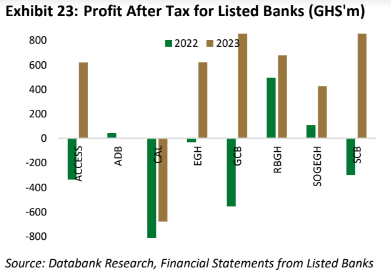- says interest rates, efficiency to drive earnings amid CRR directive
- projects 20%±500bps year-end GSE-CI return
By Ebenezer Chike Adjei NJOKU
Banking stocks are expected to remain a positive investment option despite the recent Bank of Ghana (BoG) Cash Reserve Ratio (CRR) requirement directive which is expected to marginally dampen earnings in the short term.
Analysts believe high interest rates – in the region of 20 to 29 percent – and improved efficiency will continue to support overall earnings growth in the banking sector.
The positive outlook comes on the heels of the new, tiered CRR rule announced by the central bank last month. It requires banks to hold a higher percentage of their deposits as reserves, which could limit their ability to invest in government securities, especially in treasury bills, as about 95 percent of banks shore up GH¢14billion to GH¢19billion in reserves.
However, analysts believe this short-term headwind will be outweighed by the long-term benefits of the CRR rule. The move is aimed at incentivising banks to lend more, which could boost economic growth and further increase bank profits.
“We expect lower impairment provisioning and improved efficiency to support banks’ profitability,” analysts at Databank Research said in their Strategy Report for the first quarter (Q1).
“In view of the recent adjustment to CRR for banks, we foresee a mild effect on earnings in the medium to long term. However, we expect the loan-to-deposit effect on CRR to augur well for banks’ core business, leading to an aggressive but cautious expansion of loan books that will contribute to earnings growth,” they added in the report dubbed ‘Positioning For Sustainable Growth’.
Post-exchange recovery
Banking stocks defied expectations and emerged as a bright spot in the first quarter of 2024, reversing a trend of underperformance caused by the Domestic Debt Exchange Programme (DDEP).
The Ghana Stock Exchange Financial Stock Index (GSE FSI) surged 11 percent at the end of Q1 over the previous year, reflecting a positive year-to-date (YtD) return of 5.25 percent.
Leading the charge were Access Bank (up 30.88 percent, YtD), Ecobank (10.91 percent, YtD), Standard Chartered Bank (9.69 percent, YtD), and GCB Bank ( 0.88 percent, YtD).
These banks built on strong full-year 2023 results, effectively reversing earlier impairment losses. This reversal reignited investor confidence, with FY23 financials acting as a catalyst for the sector’s overall improvement.
However, CalBank (down 12.5 percent, YtD) stood out as the sector’s lone decliner. This performance can be attributed to two key factors: the announcement of a GH¢600million rights issue to raise fresh capital, and a significant decline in interest income (19 percent) and net profit (26 percent) for the first quarter of 2024.
At the close of the second trading week in May 2024, the Financial Index had made a year-to-date gain of 7.2 percent.
With many banks currently trading at a discount of approximately 40 percent to their book value, Databank added that these stocks present a good entry point for investors seeking to capitalise on the sector’s long-term growth prospects.
Broad market outlook
Databank is projecting a year-end return for the GSE of as high as 25 percent, fuelled by a recuperating local economy. Looking ahead to the second quarter of 2024, they remain bullish on the stock market due to the improving economic climate.
Additionally, they expect dividend payouts across most non-financial stocks in the second quarter of 2024 to positively impact stock prices, with MTN, Total and fast moving consumer goods (FMCG) stock expected to play prominent roles.
“Looking ahead into 2Q24, we maintain a favourable outlook for the equities market with the improving Ghanaian economy. Also, we expect the dividend play dynamics across most non-financial stocks in 2Q24 to augur well for stock prices. Given these positive backdrops, we reiterate our expectation of the GSE-CI closing around 3,756 points by the end of 2024, translating to 20%±500bps,” the report stated.










